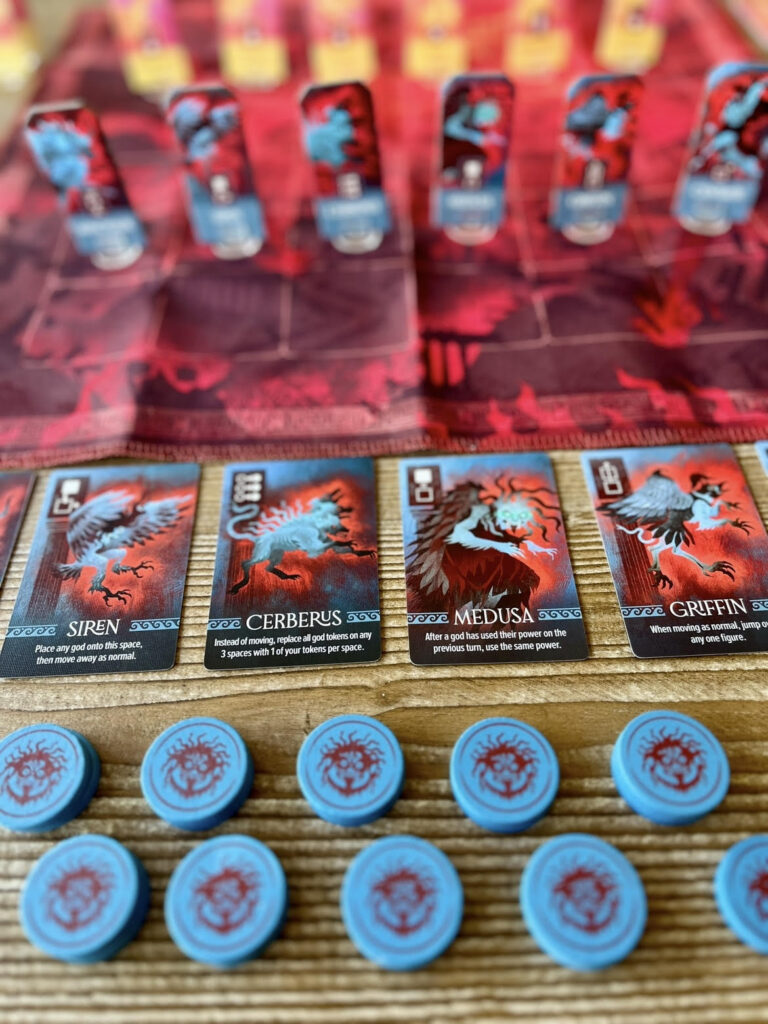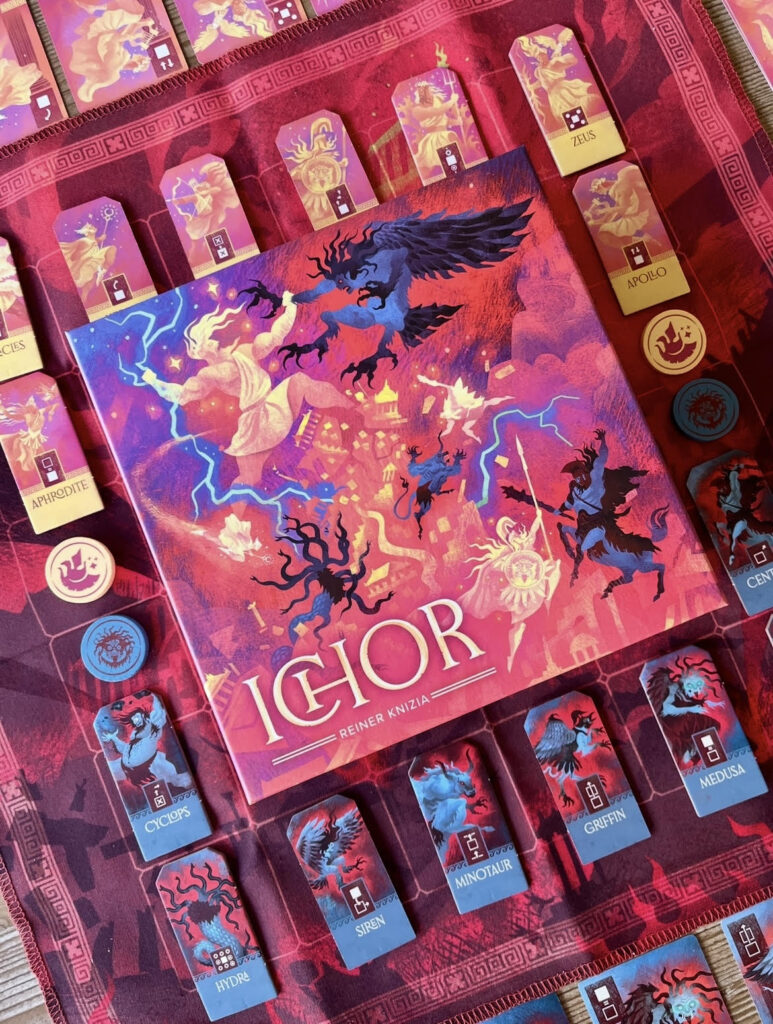In a world increasingly pulled into noise and excess, Ichor offers an interesting kind of silence. Not the silence of absence, but the silence of concentration. It’s the quiet sound of thought meeting thought and move meeting move in a battle of wits.
The rules are deceptively simple, as is the staple of many of Knizia’s games. Having been around the block before though, I didn’t have my “surely I’ve misunderstood” moment I usually do. No, this time I was prepared for just two brains trying to outmaneuver each other on a small grid.
As I’ve said before (in my Modern Art review), Knizia’s games aren’t complete when there’s nothing left to add. They’re complete when there’s nothing left to take away. It’s so easy to forget that the deepest things in life are not complex, but clear. Ichor is simple, not because it is shallow, but because it is distilled.
One player takes the Gods, the other takes the Monsters. Each side has 14 tokens, and the goal is simply to place all your tokens on the 6×6 grid board first (or 7×7 and 19 tokens for an optional variant). On your turn you may either move or use a figure’s power.

If you choose to move, you pick one of your six figures on the board and move it as far as you want in a straight line, up, down, left or right. As it moves, you drop a token on each empty space it passes through. But there are a few restrictions: you can’t move through spaces that have another figure on them, and no space can ever hold more than one thing (token or figure).
If you move through a space that already has one of your opponent’s tokens, you boot it off and replace it with your own. That’s where the tug-of-war comes in…this constant swapping and jostling for position.
But things really start to open up when you use the character powers. Each of the twelve mythological characters on the board has a unique ability, and any of them can be activated on your turn instead of moving.
That’s where you stumble a little early on. I’d get halfway through a turn before realizing ohhh dang, I could have used my Griffin to jump over your god, or used my Hydra to murder all the enemy tokens around me. But the powers settle in fairly quickly. They begin to stick in your mind because a lot of them (though not all) feel intuitive. The Minotaur can slip off one edge of the board and reappear on the opposite side. Heracles can shove a monster straight out of the way with his superhuman strength.

What I love most is how tight the game feels. It’s all forward pressure. There’s no build-up turns. Just immediate tension. Tit-for-tat all the way down. My husband thrives in that. He’s got that clean, logical engineering brain that breaks down a problem. I’m a little messier, more intuitive and responsive. I’m used to quick decisions and fluid thinking from my ICU days. We approach strategy totally differently, so our matches were intense and cool to see the results of our different thinking. We were 50-50 after four full games. We were hardly talking, hardly breathing, and it just ended with a quiet “dang”. We were locked in. That kind of head-to-head clash is rare and very satisfying.
That said, Ichor isn’t quite as pure as some of Knizia’s other abstracts, including, for me, Iliad. The powers add texture and theme, which I like, but they also mean you’re reading your cards more, double-checking what’s available, trying to hold more in your head. It’s not hard, but it’s not pure minimalist either. And one more nitpick I would be remiss not to mention: the retail version standees fall over constantly. If I bothered to pull out my iron (I’m sure it’s somewhere…) for the cloth board, this issue would be solved but I don’t want to do choresssss.

Now, I’m not a game designer and don’t claim to have any rare insight into how these kinds of games are built. I don’t look at a grid and start deconstructing design decisions and hidden mechanics etc. All I can really offer is how it felt to play. And how it felt is that Ichor is one of the better abstracts I’ve spent time with, and it deserves to be loved for what it is, and not in comparison to Iliad. But..*but*…I did like Iliad just a little bit better.
And maybe that’s part of what’s on my mind. Ichor launched alongside Iliad, and together they’re a striking pair. But releasing two games at once makes it harder to focus on either. I find myself ping-ponging between them, comparing, ranking, moving on. It’s the scroll-brain we all have now. “Cool, what’s next?” It’s not a flaw of Ichor or of Bitewing Games…it’s just the air we breathe now. And honestly, I’m not sure how much of that mindset lets these games live the long life they deserve.
So, with that thought in mind, I will be happy to keep Ichor on my shelf for years, going back to it whenever I’m in the mood. I’m a pretty casual ditcher of games I feel anything less than obsessed with and I keep a fairly slim collection. Ichor passes that test with beautiful bright pink colors and I know my husband and I will enjoy our quiet to-the-death matches for years to come.

Thank you to Bitewing Games for the generous review copy.